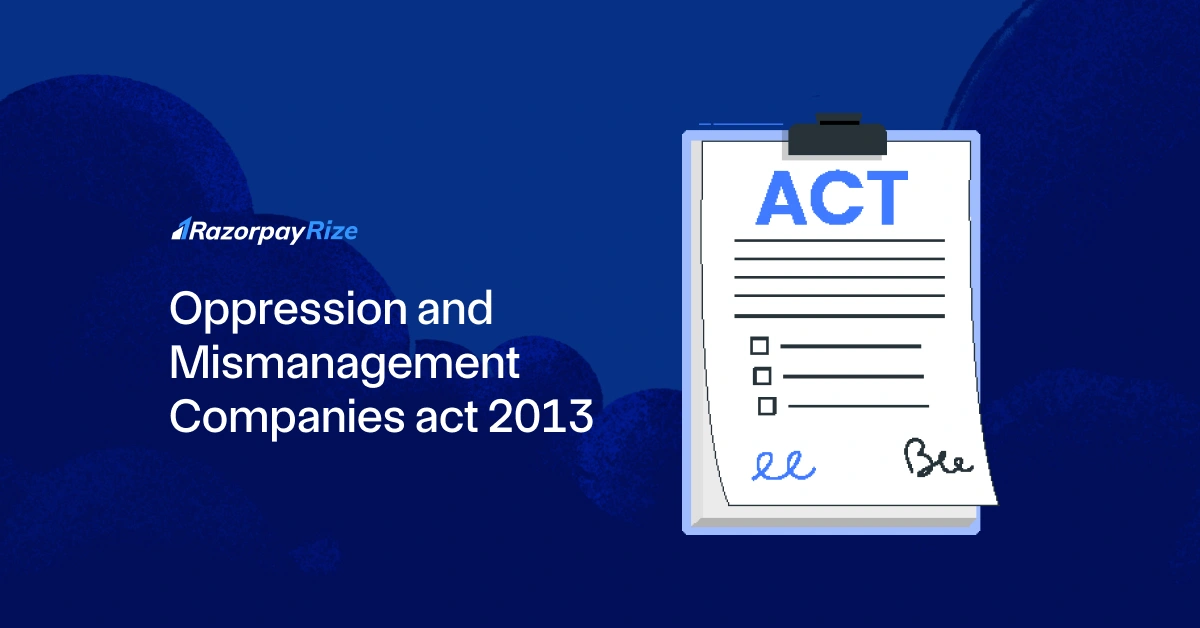As companies grow and evolve, differences of opinion and disputes naturally arise, sometimes over strategy, sometimes over control, and sometimes over financial decisions.
While many of these conflicts can be managed through negotiation or internal governance mechanisms, certain situations can cross a line, leading to behaviour that harms the rights of minority shareholders or threatens the health of the company itself. This is where the law draws a clear boundary.
When such conduct becomes oppressive, abusive, or results in serious mismanagement, the Indian legal system provides special protections under the Companies Act, 2013. These protections are crucial because, without them, minority shareholders and the company could suffer long-term damage.
In this blog, we’ll explore the meaning of oppression and mismanagement, explain the legal remedies available under Sections 241–246 of the Companies Act, and guide you through who can file a complaint, when, and how.
Table of Contents
Defining Oppression and Mismanagement
The Companies Act, 2013, does not explicitly define oppression and mismanagement. Instead, their meanings have evolved through judicial interpretations and case law.
In simple terms:
- Oppression involves burdensome, harsh, or wrongful conduct toward minority shareholders. It typically refers to situations where the majority shareholders abuse their power to harm the minority's rights or interests.
- Mismanagement refers to gross mismanagement of company affairs, which could lead to financial loss or harm to the company’s reputation or operations. It often involves negligence, fraud, or actions taken in bad faith by those in control.
Legal Remedies under Sections 241–246
Sections 241 to 246 of the Companies Act, 2013 empower company members to approach the National Company Law Tribunal (NCLT) if they believe the company’s affairs are being conducted in a manner that amounts to oppression or mismanagement.
If the tribunal is satisfied, it can order remedies such as:
- Regulation of the company’s future conduct
- Removal of directors
- Termination, modification, or setting aside of certain agreements
- Recovery of misappropriated funds
- Preventive actions to safeguard the company’s interests
A Detailed Explanation of Section 241
Section 241 of the Companies Act, 2013 is the core provision that allows members to seek relief from oppression and mismanagement.
Section 241 exists to protect minority shareholders and the company itself from conduct that threatens their interests. It ensures that no shareholder or director misuses their powers to the detriment of others or the company.
Under Section 241, a member can apply to the NCLT if:
- The company’s affairs are being conducted in a manner oppressive to any member(s).
- There has been mismanagement that threatens to cause serious prejudice to the interests of the company, members, or the public.
How can an Application be made under Section 241?
Filing an application under Section 241 involves a specific legal process:
Who Can Apply?
Eligible members include:
- Shareholders holding at least 10% of the company’s issued share capital
- In companies without share capital, at least 1/5th of the total number of members
In certain cases, members may request NCLT permission to file even if they do not meet the above thresholds (especially where the majority is acting in bad faith).
Grounds for Filing
The application must clearly describe:
- Acts of oppression (specific conduct harming member rights)
- Acts of mismanagement (negligence, fraud, misconduct, etc.)
- Resulting harm to the company or its members
Documentation Required
- Petition/application under Section 241
- Evidence of shareholding or membership eligibility
- Documentary proof of oppressive/mismanaged conduct
- Affidavit verifying the facts
- Court fees as prescribed
Where to File?
Applications must be filed with the relevant bench of the National Company Law Tribunal (NCLT) having jurisdiction over the company’s registered office.
{{company-reg-cta}}
Who Can File an Application under Section 241 of the Companies Act, 2013?
Eligibility to file under Section 241 depends on the applicant’s status and shareholding:
In addition, the Central Government can also apply under Section 241(2) if it believes the affairs of the company are conducted in a manner prejudicial to public interest.
Frequently Asked Questions
Private Limited Company
(Pvt. Ltd.)
- Service-based businesses
- Businesses looking to issue shares
- Businesses seeking investment through equity-based funding
Limited Liability Partnership
(LLP)
- Professional services
- Firms seeking any capital contribution from Partners
- Firms sharing resources with limited liability
One Person Company
(OPC)
- Freelancers, Small-scale businesses
- Businesses looking for minimal compliance
- Businesses looking for single-ownership
Private Limited Company
(Pvt. Ltd.)
- Service-based businesses
- Businesses looking to issue shares
- Businesses seeking investment through equity-based funding
One Person Company
(OPC)
- Freelancers, Small-scale businesses
- Businesses looking for minimal compliance
- Businesses looking for single-ownership
Private Limited Company
(Pvt. Ltd.)
- Service-based businesses
- Businesses looking to issue shares
- Businesses seeking investment through equity-based funding
Limited Liability Partnership
(LLP)
- Professional services
- Firms seeking any capital contribution from Partners
- Firms sharing resources with limited liability
Frequently Asked Questions
What is Oppression and Mismanagement under the Companies Act, 2013?
Oppression refers to conduct by the majority or those in control of a company that is burdensome, harsh, or wrongful to minority shareholders or other members. This includes denying members their rights, misusing powers, or making decisions that unfairly prejudice certain shareholders.
Mismanagement involves irregular, dishonest, or inefficient management that could harm the company’s affairs, financial health, or reputation. This may include siphoning off funds, non-compliance with the law, or actions detrimental to the company’s interests.
What are Sections 241 and 242 of the Companies Act, 2013?
- Section 241 allows a company member (with the required shareholding) to file a complaint to the NCLT if they believe:
- The affairs of the company are being conducted in a manner oppressive to any member or prejudicial to public interest or company interest.
- There has been mismanagement that may harm the company’s business or finances.
- Section 242 outlines the powers of the NCLT to provide remedies if it finds the complaint valid. These remedies include:
- Removing directors
- Regulating the conduct of the company’s affairs
- Cancelling or modifying agreements
- Restricting share transfers
- Any other order to bring an end to the matters complained of
Can a suit be filed without notice?
In general, civil suits require prior notice if specified under law or contract. However, in urgent or exceptional cases (e.g., injunctions or matters of immediate harm), courts may allow filing without notice to the other party initially—this is called ex parte action. But such relief is usually temporary, and notice must follow.
Can a company file a case against an employee?
Yes, a company can file a legal case against an employee in situations such as:
- Breach of employment contract
- Theft or misappropriation of company assets
- Violation of confidentiality or non-compete clauses
- Harassment or misconduct
- Fraud or criminal activity
The nature of the case (civil or criminal) will determine whether it is filed in a civil court, criminal court, or through a regulatory body like the labor commissioner or cybercrime unit.
















